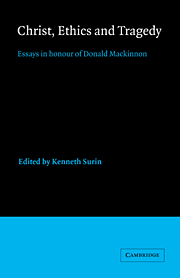Book contents
- Frontmatter
- Contents
- Preface
- Donald MacKinnon
- 1 Theological rhetoric and moral passion in the light of MacKinnon's ‘Barth’
- 2 Idealism and realism: an old controversy dissolved
- 3 Modes of representation and likeness to God
- 4 MacKinnon and the parables
- 5 Trinity and ontology
- 6 Some aspects of the ‘grammar’ of ‘incarnation’ and ‘kenosis’: reflections prompted by the writings of Donald MacKinnon
- 7 Tragedy and atonement
- 8 MacKinnon and the problem of evil
- 9 Pride and international relations
- 10 ‘Between purgation and illumination’: a critique of the theology of right
- 11 On being ‘placed’ by John Milbank: a response
- Index of names
- Index of subjects
1 - Theological rhetoric and moral passion in the light of MacKinnon's ‘Barth’
Published online by Cambridge University Press: 11 March 2010
- Frontmatter
- Contents
- Preface
- Donald MacKinnon
- 1 Theological rhetoric and moral passion in the light of MacKinnon's ‘Barth’
- 2 Idealism and realism: an old controversy dissolved
- 3 Modes of representation and likeness to God
- 4 MacKinnon and the parables
- 5 Trinity and ontology
- 6 Some aspects of the ‘grammar’ of ‘incarnation’ and ‘kenosis’: reflections prompted by the writings of Donald MacKinnon
- 7 Tragedy and atonement
- 8 MacKinnon and the problem of evil
- 9 Pride and international relations
- 10 ‘Between purgation and illumination’: a critique of the theology of right
- 11 On being ‘placed’ by John Milbank: a response
- Index of names
- Index of subjects
Summary
Introduction
Donald MacKinnon has been a central figure in the pursuit of theology in Britain for half a century. To express this platitude is, however, but to uncover a seething mass of difficulties presented not only by the intrinsic characteristics of MacKinnon's work, which is often both brilliant and highly obscure, but also by his position as an ‘outsider’ subsisting at the centre of the network of personal relationships, which, for better or for worse, has constituted the established core of a tradition not notable for either consistency or dialectical penetration. The resistance to the codification of tradition, particularly in England and in English theology, and the context of that tradition, in comprehensive historical terms, mean that for those of us who have grown up in the post-war context the personal environment of pre-war and wartime Oxford in which MacKinnon himself developed is becoming rapidly less well–known and increasingly distant. Thus, even where serious work is in evidence, in, for example, the dominant account of Anglican social teaching, that of E. R. Norman, this tends to subvert and distort the seriousness of the socially concerned groupings (such as the Christendom group) by a ruthless stress upon naivety and short-sightedness that devalues our understanding of the immediate context of MacKinnon's intellectual youth. It is because of this and other factors that the interpretation of MacKinnon and his work, as an inside ‘outsider’, presents very considerable difficulties.
- Type
- Chapter
- Information
- Christ, Ethics and TragedyEssays in Honour of Donald MacKinnon, pp. 1 - 14Publisher: Cambridge University PressPrint publication year: 1989
- 1
- Cited by

